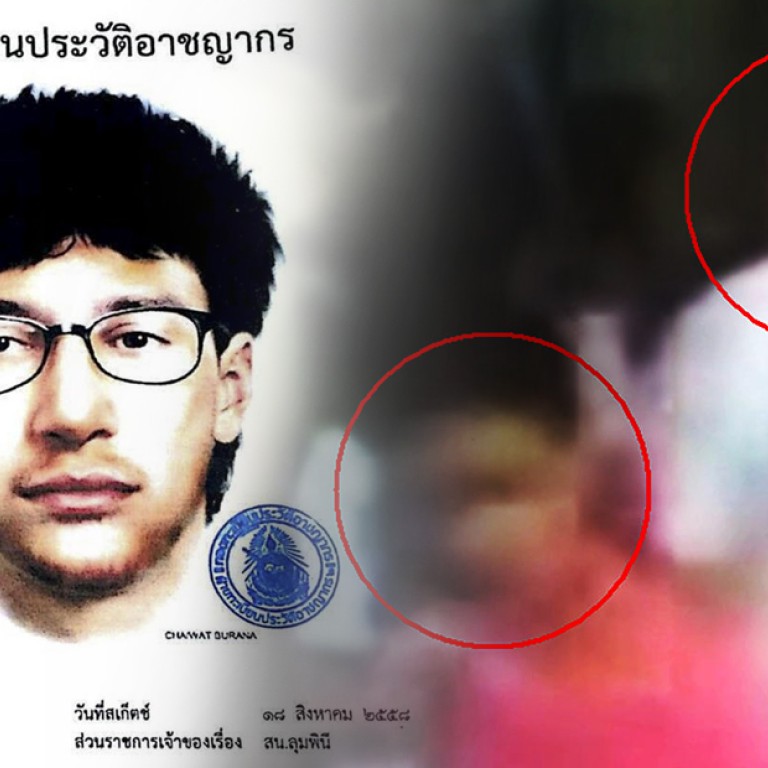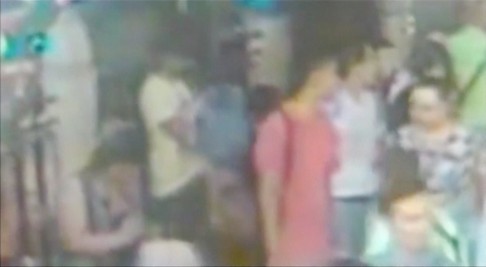
Update | Thai police clear two Bangkok bomb suspects including man from China but main suspect remains at large
A Thai man wanted for questioning after he was seen on security camera footage “met police and was released”, national police spokesman Prawut Thavornsiri told reporters, adding a second man from China in the same shot had already left the country – but neither were “likely involved”.
Thai police said they had questioned and freed one man who handed himself in after being seen on CCTV at the Bangkok shrine moments before a deadly bomb blast, but the prime suspect remains at large.
A Thai man wanted for questioning after he was seen on security camera footage “met police and was released”, national police spokesman Prawut Thavornsiri told reporters, adding a second man from China in the same shot had already left the country – but neither were “likely involved”.
The main suspect, believed to be a foreigner in a yellow shirt seen depositing a backpack at the scene was still at large, he added.
WATCH: Thai police release drawing of suspect in Bangkok shrine bombing
The two men – the Thai in a red shirt, and the Chinese in white – were initially believed to be possible accomplices of the suspected bomber.
They were seen standing in front of the lead suspect as he took a backpack off and placed it under a bench. They then left the crowed shrine in central Bangkok.
Moments later the bomb exploded killing at least 20 people, mainly foreigners, wounding scores more and sparking a manhunt for the bomber.
“The Thai man is from Chiang Mai,” Prawut said, explaining he had taken the Chinese man to the Erawan shrine on behalf of a mutual friend. The Chinese man returned home a day after the bomb.
READ MORE: China slams reports of Uygur link to Bangkok blast as ‘hugely irresponsible’

But they say they are still confident a bespectacled man in the yellow shirt, described in his arrest warrant as a foreigner is the prime suspect.
Yesterday, Thailand’s ruling junta said the attack was "unlikely" to be the work of international terrorists, adding it was not specifically targeted at Chinese tourists.
"Security agencies have cooperated with agencies from allied countries and have come to the preliminary conclusion that the incident is unlikely to be linked to international terrorism," said Colonel Winthai Suvaree, a spokesman for the junta, known as the National Council for Peace and Order.
The Erawan shrine is popular with Chinese tourists. Thailand’s police chief said at least 10 people were suspected of involvement in the attack that killed 20 people, more than half of them foreigners.
"It is a big network. There was preparation using many people," police chief Somyot Poompanmuang told reporters.
"This includes those who looked out on the streets, prepared the bomb and those at the site and ... those who knew the escape route," he said. "There must have been at least 10 people involved."
Thailand said it would seek help from Interpol on finding the first suspect spotted in CCTV footage casually dropping a backpack at the shrine and then leaving moments before the explosion ripped through the popular tourist site. Police are unsure if the man, who was wearing a yellow T-shirt and spectacles, had fled the country.
WATCH: Device explodes near Bangkok rail station
An arrest warrant was issued for the unnamed suspect and released a composite image of him in glasses and with dark hair, describing him as tall and with fair skin.
In grainy security video, the young man with shaggy dark hair is seen entering the shrine compound with a backpack on, sitting down against a railing and then slipping out of the bag’s straps. He then stands up and walks out apparently holding a mobile phone, leaving the bag by the fence as tourists mill about.
Police spokesman Prawut Thavornsiri on Wednesday gave a more detailed profile of the suspected ethnicity of the alleged bomber, using the Thai phrase “khaek khao” -- a word used to describe light-skinned Muslims from South Asia, Central Asia and the Middle East.
Nobody has claimed responsibility for the bombing, which has no precedent in Bangkok.
“We will seek help from Interpol today,” Major General Apichart Suriboonya, the head of Thailand’s Interpol unit, said. “We have to use them... if any country has information on the suspect they can send it to us.”
A so-called Interpol "Blue Notice" asks its global membership to collect additional information on a suspect.
“We are doing our best,” Prawut said. “We have received a lot of information from the public since releasing of the sketch... we are investigating those leads."
When asked if the prime suspect was still in the kingdom, Prawut said: ”I don’t know”.
The arrest warrant, issued by a Bangkok court on Wednesday, accused the unnamed foreigner “of premeditated murder, attempted murder and bomb-making”.
The explosion claimed the lives of at least 13 foreigners -- from Britain, China, Hong Kong, Indonesia, Malaysia and Singapore.
Another 67 people remained in hospital by late Wednesday, 12 of whom were in critical condition.
Prime Minister Prayut Chan-O-Cha has described the bombing as the “worst ever attack” on Thailand.
It remains unclear who has the capacity and desire to carry out the mass casualty attack on a Southeast Asian nation that has not been hit by terrorism on such a scale.
Left with just guesswork, Thai media outlets have cast suspicion on militants from China’s Uygur minority, a group that faces cultural and religious repression in its homeland.
Last month Thailand forcibly repatriated more than 100 Uygur refugees to China, stirring speculation that Monday’s attack may have been an act of revenge.
But Uygur groups are not known to have ever carried out an attack outside China.
Islamic militant groups have targeted parts of Southeast Asia, including bombings on Indonesia’s holiday island of Bali in 2002 that killed 202 people. But Thailand has not been a prime target.

